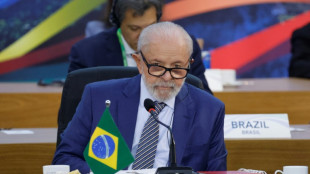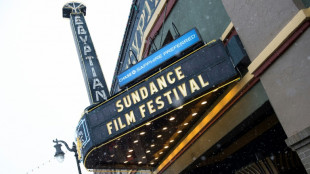
-
 UN General Assembly calls for 'unconditional' Gaza ceasefire
UN General Assembly calls for 'unconditional' Gaza ceasefire
-
Dortmund fear 'worst-case scenario' after Schlotterbeck injury

-
 Juve deepen Man City crisis, Barcelona into Champions League knockouts
Juve deepen Man City crisis, Barcelona into Champions League knockouts
-
'Incredible' Saka makes the difference for Arsenal: Arteta

-
 'We want more', says Olmo with Barcelona bound for knock-outs
'We want more', says Olmo with Barcelona bound for knock-outs
-
Guardiola 'questioning self' after latest City loss at Juve

-
 Nasdaq surges above 20,000 after US inflation data matches estimates
Nasdaq surges above 20,000 after US inflation data matches estimates
-
Torres sinks Dortmund to send Barcelona into knockouts

-
 UN General Assembly calls for 'unconditional' ceasefire in Gaza
UN General Assembly calls for 'unconditional' ceasefire in Gaza
-
US House passes defense bill banning gender care for minors

-
 Turkey says Ethiopia, Somalia reach compromise deal to end feud
Turkey says Ethiopia, Somalia reach compromise deal to end feud
-
Saka brace sinks Monaco as Arsenal eye Champions League last 16

-
 Man City crisis deepens with Champions League defeat at Juventus
Man City crisis deepens with Champions League defeat at Juventus
-
Ashworth exit 'not the best' for Man Utd says Amorim

-
 Romero sorry over Spurs transfer jibe: Postecoglou
Romero sorry over Spurs transfer jibe: Postecoglou
-
Lula to undergo new operation to 'minimize' cranial bleeding risk

-
 New Syria PM says will 'guarantee' all religious groups' rights
New Syria PM says will 'guarantee' all religious groups' rights
-
Wolfsburg earn key win over Roma in Women's Champions League, Lyon net six

-
 Murder rate in Amazon far higher than rest of Brazil: study
Murder rate in Amazon far higher than rest of Brazil: study
-
Malibu wildfire grows as thousands still evacuated

-
 Pachuca down Botafogo in Intercontinental Cup
Pachuca down Botafogo in Intercontinental Cup
-
UN General Assembly to vote on 'unconditional' ceasefire in Gaza

-
 Nine killed in Haiti in latest gang attack
Nine killed in Haiti in latest gang attack
-
US-China officials to hold economic talks before Trump return

-
 Saudi Arabia gave 'assurances' over LGBTQ fans at World Cup: English FA
Saudi Arabia gave 'assurances' over LGBTQ fans at World Cup: English FA
-
Rangers can create magical night against Tottenham, says Clement

-
 Galliano says leaving Maison Margiela after 10 years
Galliano says leaving Maison Margiela after 10 years
-
Stocks mostly rise as US inflation data boosts rate cut hopes

-
 Sundance unveils eclectic lineup for 2025
Sundance unveils eclectic lineup for 2025
-
FIFA confirms Saudi Arabia as 2034 World Cup host

-
 Germany's Scholz urges investment in 'future EU member' Ukraine
Germany's Scholz urges investment in 'future EU member' Ukraine
-
EU conservatives seek to stall 2035 combustion engine ban

-
 2034 World Cup in Saudi Arabia puts lives at risk: rights groups
2034 World Cup in Saudi Arabia puts lives at risk: rights groups
-
Russia vows retaliation after Ukrainian ATACMS strike

-
 Canada central bank makes half point rate cut to 3.25%
Canada central bank makes half point rate cut to 3.25%
-
US consumer inflation accelerates for second straight month in November

-
 Lula alert, 'progressed well' since intracranial surgery
Lula alert, 'progressed well' since intracranial surgery
-
Relatives of Syria's disappeared seek closure in Damascus morgues

-
 Food fight: $25 bn US grocery deal falls apart
Food fight: $25 bn US grocery deal falls apart
-
Google unveils latest AI model, Gemini 2.0

-
 MSF resumes some activities in Haiti's capital
MSF resumes some activities in Haiti's capital
-
NFL announces Berlin game for 2025 season

-
 Apple adds ChatGPT integration in latest software update
Apple adds ChatGPT integration in latest software update
-
US consumer inflation rises for second straight month in November

-
 Afghan refugees minister killed by suicide blast
Afghan refugees minister killed by suicide blast
-
Alisson savours 'perfect' Liverpool return

-
 Crunch time for Saudi-hosted drought, desertification talks
Crunch time for Saudi-hosted drought, desertification talks
-
FIFA to confirm Saudi Arabia as 2034 World Cup hosts

-
 Macron urges release of Georgia protesters in Ivanishvili talks: Elysee
Macron urges release of Georgia protesters in Ivanishvili talks: Elysee
-
France's Macron races to choose new PM


Cash crunch fuels rising misgivings against Nigeria's money agents
Mobile money agents have become a familiar sight across Nigeria, using handy point-of-sale machines to provide essential services to millions of people without access to banking, particularly in hard-to-reach rural areas.
Even on the streets of major cities they have become a go-to, due to an ongoing shortage of cash at ATMs since a much-vilified redesign of the national currency, the naira, last year.
"There are three of them (agents) on my street alone," Chi Etche, a 29-year-old media executive, told AFP. "This means I don't need to take a bike or cab to reach the nearest bank ATM."
But opposition is growing to their activities, with claims that some are exploiting the country's financial plight, compounding the worst cost-of-living crisis that Nigerians have faced in decades.
"We are now buying back our money from (point-of-sale) PoS agents," Ibrahim Adamu, a 39-year-old trader, told AFP. "The commission they charge is increasing and you can hardly get cash from the machines."
In 2013, the Central Bank of Nigeria (CBN)announced a drive to improve access to financial services across the country.
According to Enhancing Financial Innovation and Access (EFInA), an NGO, by the end of last year at least 74 percent of adults in Nigeria had access to financial services. Just over half (52 percent) used traditional banks.
The central bank's decision and the cash crunch, however, have given ordinary Nigerians reliant on cash no alternative but to use agents, experts say.
"CBN policies simultaneously raised barriers for banks to offer cash and cash alternatives to their customers in pursuit of its cashless policy mandate," said Ikemesit Effiong, a partner at Lagos-based risk consultancy SBM Intelligence.
Agents, however, often operate without identity checks of their customers or regulatory oversight, he added.
- Capped cash withdrawals -
The CBN announced that it was redesigning the naira in October 2022.
Soon after, Godwin Emefiele, the CBN governor at the time, then ordered a cap on cash withdrawal from ATMs and in banking halls as the presidential election approached.
"Over 85 percent of cash that is in circulation is outside the banks," he said at the time.
Vaunted as part of the bank's cashless policy push, the restrictions put pressure on businesses, sparked angry protests, and gave mobile money agents leverage to exploit the cash shortage.
ATM withdrawals are still capped at 20,000 naira ($12.45) per day when withdrawing from one's own bank. Withdrawals from another bank are restricted to just 5,000 naira a day.
Over-the-counter withdrawals of large sums attract punitive charges. Moreover, long queues in banking halls and frequent ATM service downtimes worsen the problem.
That has driven more people towards mobile money agents, said Uzoma Dozie, the founder of challenger bank Sparkle.
- 'Excessive fees' -
Many Nigerians accused bank officials of diverting cash meant for ATMs to agents for personal gain.
"Some agents exploit cash scarcity by charging excessive fees for cash withdrawals and transactions," Dozie told AFP.
"However, this practice isn't inherent to the mobile money system but rather a symptom of broader cash availability issues and inadequate oversight."
A few agents told AFP they also get their cash to run their businesses from other sources.
"I go to markets to buy cash from traders and bureaux de change. I factor that into the commission I charge customers when they come to withdraw cash from me," said Ayo Olaoluwa, 34.
Ifeoma Onwuabuchi, 46, got started with about 100,000 naira.
"That's why you see a lot of people coming into the space. The income is not big but it helps keep me moving," Onwuabuchi said.
A spokesman for the influential Association of Mobile Money and Banking Agents of Nigeria did not immediately respond to AFP's request for comments.
However, Dozie insisted that proper regulation and enforcement can address the concerns while preserving the "benefits of agent banking".
CBN governor Olayemi Cardoso insisted that empty cash machines will not be tolerated and warned that defaulting banks "will face stringent penalties".
"We also urge full regulatory compliance by all stakeholders, including Mobile Money Operators and PoS Agents, to promote digital transaction channels and improve service delivery," he said.
J.Bergmann--BTB
